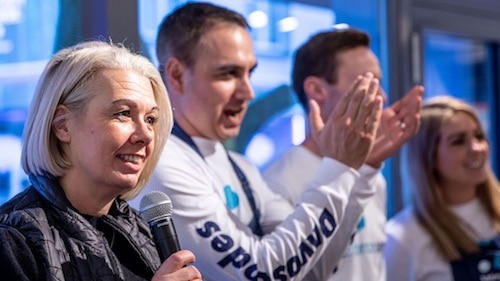Last week’s annual World Economic Forum (WEF20) in Davos, Switzerland brought together the most powerful political and business leaders from around the world to discuss a theme that emerged at last year’s WEF: the need for a capitalism that serves both shareholders and stakeholders and helps “sustain our economic system for future generations,” says WEF Founder and Executive Chairman Klaus Schwab.
The 2020 Edelman Trust Barometer surveyed more than 30,000 people in 28 markets and found that 56% of respondents think capitalism does “more harm than good.”
WEF20 conversations stressed the need to think beyond profits and serving shareholders and to begin valuing trust with stakeholders above all else. For businesses, those stakeholders include not only customers and employees but the younger generations, our planet, the climate, and communities served. As Schwab wrote in an article published last year addressing business leaders, “If they really want to leave their mark on the world, there is no alternative.”
Four significant themes emerged from last week’s event:
Young activists are at the forefront of action on climate change
Each year the WEF hosts 50 youth leaders with grassroots experience from the Global Shapers community to “help set the agenda for businesses, governments, and civil society,” according to Jaideep Bansal from the 2018 Global Shapers cohort. This year, seventeen-year-old climate activist Greta Thunberg was among the 50 selected to attend.
She expressed the need for the voices of young people to be at the center of the conversation, “This is about us and our future, and future generations, and of course those who are already being affected today.”
Thunberg’s words were echoed by her fellow activists during a panel hosted by TIME Magazine titled “Forging a Sustainable Path Towards a Common Future.” She was joined on stage by Salvador Gómez-Colón, 16; Autumn Peltier, 16; and Natasha Mwansa, 18.
“We’re not waiting five, 10, 20 years to take the action we want to see. We’re not the future of the world, we’re the present. We’re acting now, we’re not waiting any longer,” said Gómez-Colón. Mwansa added, “Either partner with us or we’ll do it because we’re powerful enough.”
Read more stories of youth change-makers including how two teenagers helped change the law on plastic pollution in Indonesia.
Business leaders call for a commitment to sustainability
Klaus Schwab kicked off the event with a letter to all attendees calling for a commitment to act on climate change. “If you have not done so already, we invite you to set a target to achieve net zero greenhouse gas emissions by 2050 or sooner.”
A report from the Intergovernmental Panel on Climate Change tells us greenhouse gas emissions have continued to increase at 1.5% per year. They must fall by 3-6% per year between now and 2030 to limit global warming to 1.5–2°C (2.7–3.6°F).
WEF20 called upon business leaders to integrate sustainability practices into their business models to counteract the effects of global warming and climate change. “We need to go from vision to execution to tangible action and we need to do it fast,” said Julie Sweet, CEO of Accenture.
Pressure for business leaders to act has risen after recent announcements from large companies like Microsoft, which plans to go carbon negative by 2030, asset manager BlackRock, which plans to put the climate at the center of their investment strategy, and Salesforce, which has committed to the acceleration of the 17 Sustainable Development Goals.
A WEF initiative backed by Benioff and his wife Lynne Benioff called 1T.org was announced at WEF20 to accelerate nature restoration to tackle climate and biodiversity crises. 1T.org is described by the WEF as a platform for leading governments, businesses, civil society, and ecopreneurs committed to restoring and reforesting the planet.
Read more about the 1T.org initiative and how your business can get involved.
Gender inclusion and diversity are top-of-mind
Of the Fortune Global 500, only 14 CEOs are women (about 3%) and less than .01% are women of color. A report released by the WEF says it will take 257 years to achieve gender parity in terms of economic participation and opportunity. Even the WEF annual meeting attendance is consistently predominantly male with female attendance typically less than 25%.
Inclusion is an opportunity for business and economic growth. The International Monetary Fund estimates the losses from economic disempowerment of women range from 10% of GDP in advanced economies to more than 30% in regions like South Asia, the Middle East, and North Africa. It’s clear we must take action to speed up the time it takes to bridge the gap.
An article by Harvard Business Review calls for men to step forward as allies for inclusion in the workplace, stating that when men are deliberately engaged in gender inclusion programs, 96% of organizations see progress — compared to only 30% of organizations where men are not engaged. A study by McKinsey projects that in a “full potential” scenario in which women participate in the economy identically to men, $28 trillion dollars (26%) would be added to the annual global GDP when compared to the current business-as-usual scenario.
The call to bridge the gender and diversity gap was top-of-mind for world and business leaders. UN Women Executive Director Phumzile Mlambo-Ngcuka and Deputy Executive Director Anita Bhatia contributed their thoughts to the #fairerworld campaign on how businesses can transform into more inclusive organizations to ensure a sustainable economic system. “Businesses have a huge role to play in this enterprise because businesses can role model the values that respect and support girls and women,” said Bhatia.
Finland’s Prime Minister Sanna Marin shared her thoughts about gender inclusion by stressing the need for everyone’s support, “We all have to fight each and every day for equality, for a better life. It’s very important for everyone to step in, it’s not someone else’s job.” And Goldman Sachs chief executive David Solomon announced the company will no longer do IPOs for companies with all-male boards.
Read this article by Business Insider to learn how the tech industry is approaching the diversity problem.
The future of work depends on our ability to upskill the workforce
Technological advancements in the Fourth Industrial Revolution including AI and robotics have created skill gaps across all industries that are expected to grow faster than ever before. At least 133 million new roles generated as a result of the new division of labor between humans, machines, and algorithms may emerge globally by 2022, according to the World Economic Forum.
“As technology keeps racing ahead, putting the right people in the right jobs gets tougher—especially since, in this job market, there just isn’t enough skilled talent to go around,” states an article by Fortune.
UNICEF Executive Director Henrietta Fore says, “There are 1.8 billion young people between the ages of 10 and 24 today – the world’s largest-ever group of young people. Every month, 10 million reach working age – and they’re finding that yesterday’s skills no longer match today’s job market.”
Organizations like Year Up and Girls Who Code are working to close the opportunity gap for young people. And larger companies like Siemens, for example, are launching foundations to advance workforce development.
At last week’s event, the WEF called for businesses to identify the five fastest-growing jobs and commit to hiring equal numbers of men and women.
Read this article by Salesforce’s President of EMEA, APAC, and LACA Sales Miguel Milano about the opportunities business leaders have to upskill the workforce.
Hear advice from business executives, world leaders, youth activists, and philanthropists about how to achieve success in a stakeholder-first capitalism — watch the Davos Daily recaps.




























